
Selecting an effective marketing approach for your company may be one of the most difficult aspects of promoting your products or services. With so many marketing approaches available, it can be difficult to identify which one will be most beneficial for your particular business needs.
What works for one company might not suit another, highlighting the importance of tailoring marketing plans to each organization’s unique characteristics. Whether you own a small business, manage a mid-sized organization, or operate a large enterprise, a customized and innovative marketing strategy can lead to better outcomes.
An increasing number of business owners are recognizing the advantages of referral marketing strategies. Historically, word-of-mouth was a cost-free and often effective method of promotion. Today, referral marketing leverages this concept through a structured program designed to yield significant results. By incentivizing existing customers to recommend your business, referral marketing can transform regular customers into brand advocates and open doors to new customer bases.
Table of Contents:
Referral marketing is all about increasing your sales with the help of word-of-mouth recommendations from your existing customers instead of referral rewards. It has the potential to convert your regular customers into brand advocates and also helps you gain access to a new set of customers.
The foundation of any successful referral marketing program is a clear understanding of what you want to achieve. Whether it’s increasing customer acquisition, boosting sales, or enhancing brand awareness, having specific goals will guide the design and implementation of your referral program.
It’s important to offer attractive incentives to encourage customers to participate in your referral program. These incentives can include discounts, cashback, free products, or early access to new features. It’s crucial to strike a balance between the value of the incentive and the required action to ensure that the program is both appealing and sustainable.
A seamless and user-friendly referral process is essential to the success of your program. If the process is too complicated or time-consuming, customers are less likely to participate. Simplifying the steps involved and providing clear instructions can significantly enhance the user experience and increase participation rates.
It’s important to track and analyze the performance of your referral marketing program to understand its impact and make necessary adjustments. Use tracking tools and analytics to monitor key metrics such as the number of referrals, conversion rates, and overall ROI. This data will help you identify what works and what needs to be improved.
Most eCommerce companies don’t indulge in referral marketing as much as they should. Why? Because they are not aware of the benefits and end up using techniques like paid ads, influencer marketing, social selling, etc., which might not offer as much as referral marketing.
Referral marketing is more cost-effective than other marketing techniques. Traditional ad campaigns often yield uncertain results and can be expensive. In contrast, marketing incentives are only given when there is a signup or purchase, making referral marketing a more budget-friendly option.
Offering incentives motivates customers to promote your brand to their friends and family. These personal recommendations enhance your brand’s image as recipients perceive your brand positively due to the glowing remarks from their acquaintances.
Positive comments from someone they know significantly increase the chances of potential customers making a purchase from your brand. Personal recommendations carry more weight and trust than traditional advertising.
Referral marketing enhances customer loyalty and retention because customers who participate in referral programs often feel more connected to the brand. This engagement fosters loyalty and encourages repeat purchases. Offering rewards for referrals not only motivates customers to refer but also enhances their overall satisfaction and loyalty to the brand.
Referral marketing increases trust and credibility because people trust recommendations from friends and family more than traditional advertisements. Referrals come from a credible source, making potential customers more likely to trust and act on them. Positive referrals act as social proof, enhancing the brand’s reputation and credibility. When existing customers vouch for a brand, it builds confidence in potential buyers.
With advanced referral software like 99minds, you can effortlessly track various aspects of your referral program. This includes the number of orders placed, customers referred, and revenue generated from referred customers, allowing for detailed performance analysis and optimization.
Referrals should be incentivized. Without the right incentives, your customers will not feel like lifting a finger. Why should they? The only reason why referral marketing usually works is that people get something in return for each referral they make. This is why choosing the right referral becomes important.
The best incentives are those that are relevant to your customers. For example, an upgrade or a discount would be welcomed by customers who love offers. But the same cannot get luxury customers enthused. The incentive you choose should also be something that you can give away at scale. It should be something that doesn’t cost you a lot of money or take up countless hours.
The incentives you offer can be in the following forms: freebies, cash, discounts, upgrades, discounts, experiences, points, etc. The levels of incentives should be different based on the number of referrals the customer makes.
Marketers know that email gives you one of the best ROIs when compared with every other channel that you can use. You get $36 on every $1 you spend. Here’s what you need to do. Create a referral program and email it to customers who have purchased from you. Send emails to your old customers as well and offer them rewards to buy from you again.
Emails are a bit more personal and reliable than most other platforms– and referral marketing can fit right into your marketing campaigns. It is easy to quickly add details about your referral campaign to the emails you send out to customers.
A quick link on the signature or CTA at the bottom of every email is a great way to remind people about your referral marketing campaign.
A community creates a feeling of belongingness. It is a way to offer excellent value without spending hundreds of thousands of dollars. If used rightly, a community of your users can be your biggest advocates. They can help with spreading the word about a new product by critiquing your latest feature additions.
Like most things online, dreaming of incorporating a referral campaign without the right tools can be a nightmarish experience. The prospect of creating a feature for referral marketing is a complete waste of time. Why build it from scratch when there are tools for it?
Using referral software makes it easy to design a referral program whose efficiency can be measured and tracked for future improvements. A referral software like 99minds would make it easy to distribute referral links and offer rewards for successful referrals.
When you use the right software, it will also nudge people to sign up for your platform, send automated reminders, and so on. It will also help you collect relevant data about your referral marketing program, making it easy for you to find what is working and what isn’t.
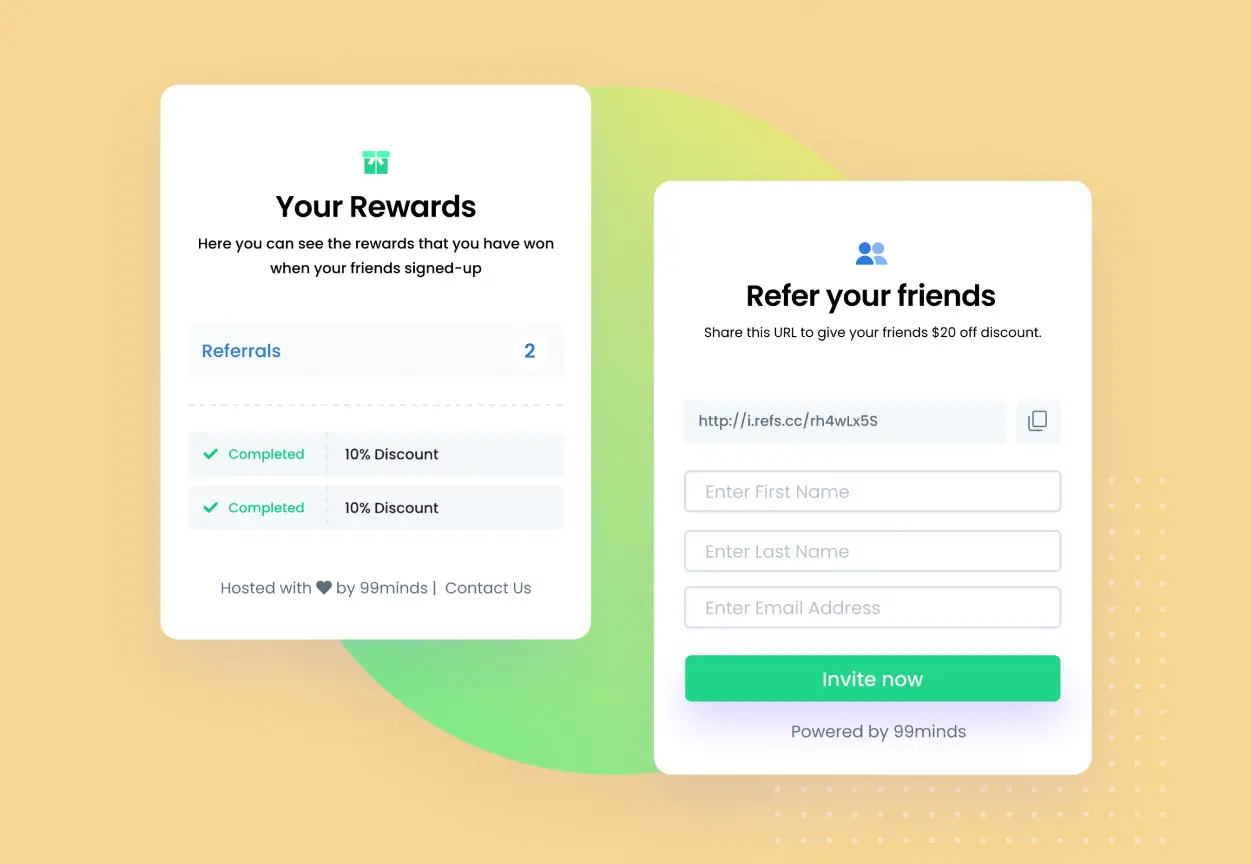
Each of us is guilty of spending almost two and a half hours on social media, lazily browsing and sharing posts. eCommerce companies should use this to their advantage by sharing posts on social media about your referral program. Most people don’t open every email that they get, nor do they notice pop-ups on your site. This is why you must add one more channel to the mix, and we know how effective it is to grab the attention of people.
Make it easy for customers to share about your referral program and its benefits. It will increase the chances of being seen by more people.

Referral marketing can take many forms, each with its unique approach and benefits. Understanding the various types of referral marketing can help businesses choose the best strategy for their specific needs. Here are some of the most common types, along with real-world examples:
Direct referrals are the most straightforward type of referral marketing. In this model, existing customers are encouraged to refer friends, family, or colleagues directly to the business. Incentives such as discounts, cash rewards, or free products are often offered to motivate customers to refer others. This type is highly effective because it leverages the trust between the referrer and the referred individual.
Example: Dropbox’s Referral Program is a classic example of direct referrals. They offer additional storage space to both the referrer and the referred person. This simple yet effective incentive helped Dropbox grow from 100,000 users to 4 million users in just 15 months.
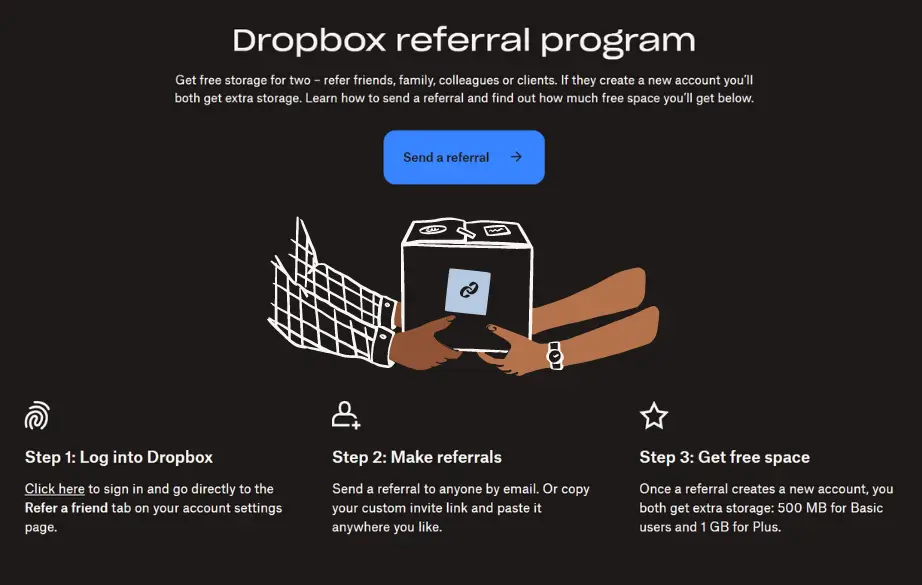
Email referrals leverage the power of email marketing to encourage referrals. Customers receive emails with referral links or codes that they can share with their contacts. This method is effective for reaching a targeted audience and can be easily tracked.
Example: PayPal’s early growth was driven by an email referral program. They offered $10 to both the referrer and the referred person when the new user signed up and linked their bank account. This strategy rapidly increased their user base.
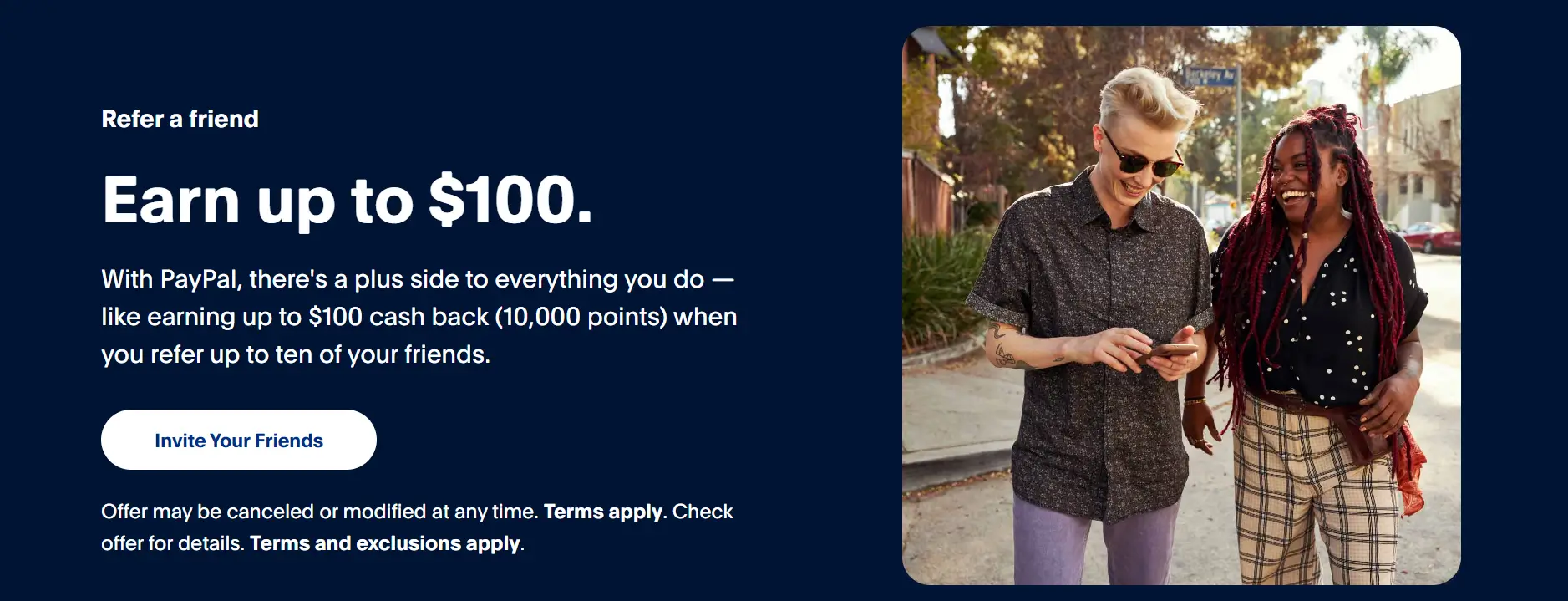
Incentive-based referrals provide tangible rewards to customers who refer others. These incentives can include discounts, cash rewards, loyalty points, or exclusive access to new products or services. The key to success with this type of referral marketing is offering incentives that are attractive and relevant to the customers.
Example: Justworks, a provider of payroll, benefits, HR, and compliance services for small businesses, has implemented an incentive-based referral program to expand its customer base.
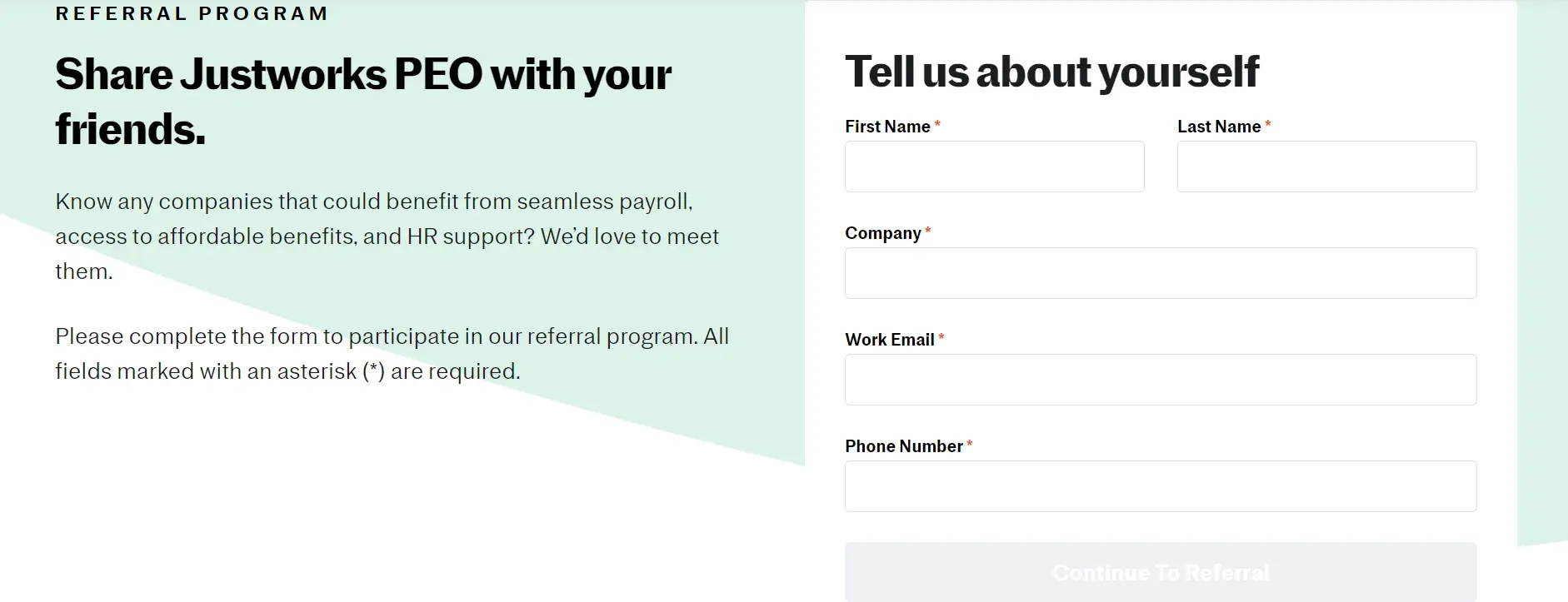
Event-based referrals revolve around special events or promotions. Customers are encouraged to refer others to attend events such as webinars, workshops, or in-store promotions. This type of referral marketing can create a sense of urgency and excitement.
Example: Amazon Prime Day is an annual event that features massive sales and exclusive deals for Prime members. It typically lasts for 48 hours and is one of Amazon’s biggest shopping events of the year.

Affiliate programs are a more structured type of referral marketing in which individuals or businesses are given a unique link to promote their products or services. Affiliates receive a commission for every sale made through their link. This method of referral marketing is common in e-commerce and online services.
Example: Glossier, a popular beauty brand known for its minimalist and skincare-focused products, has a well-structured affiliate program that leverages the influence of beauty bloggers, influencers, and content creators.

Customer loyalty programs often incorporate referral components, rewarding customers for both their purchases and their referrals. This type of referral marketing not only incentivizes referrals but also encourages repeat business.
Example: Starbucks’ Rewards Program offers points for purchases and additional points for referring friends. These points can be redeemed for free drinks and food, fostering customer loyalty and driving referrals.

Advocate programs are designed to turn loyal customers into brand advocates who actively promote the business. These programs often involve deeper engagement with customers, offering them exclusive benefits and recognition in exchange for their advocacy.
Example: Nike’s NikePlus membership program encourages customers to share their fitness achievements and Nike product experiences on social media. Members receive exclusive products, early access to new releases, and other perks, fostering strong brand advocacy.
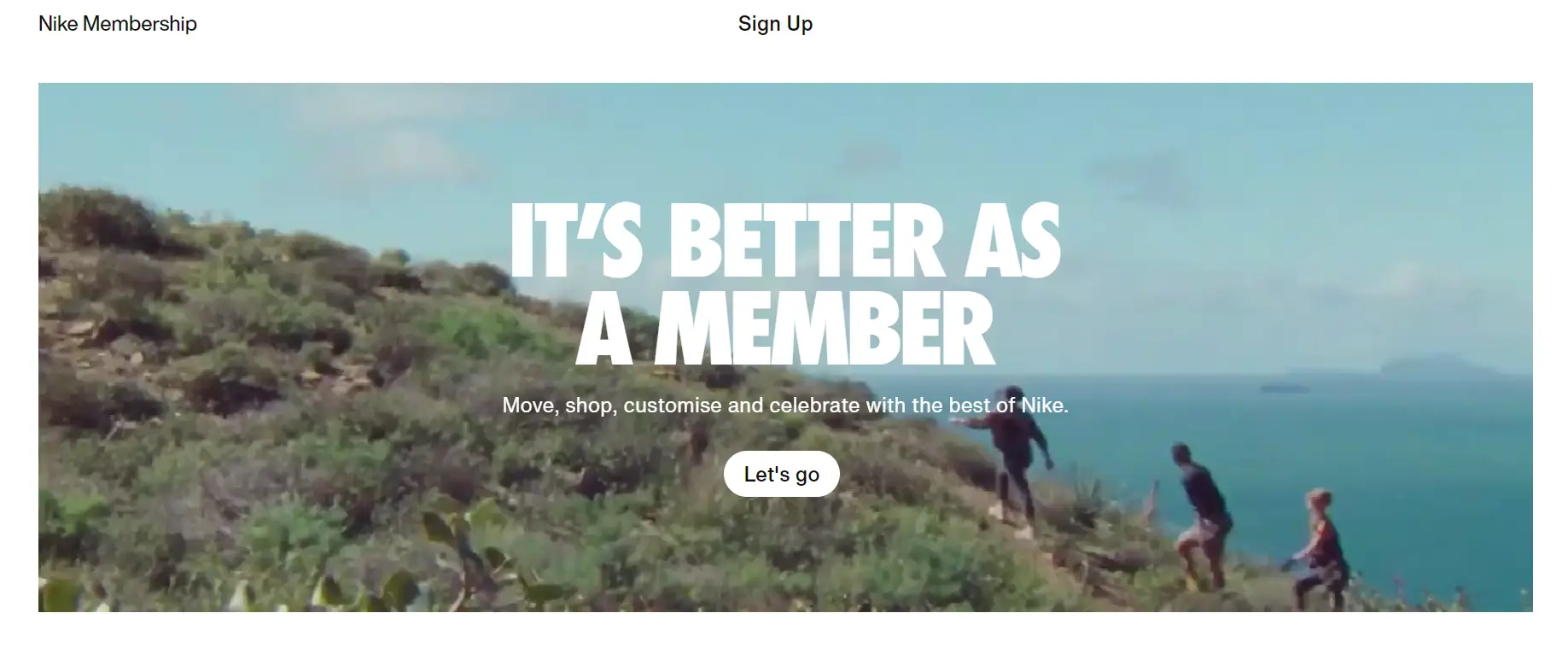
Making the right referral marketing strategies can help you get good rewards. But if you commit mistakes that aren’t supposed to be a part of your referral strategy, it will spell doom. Here are a few costly mistakes that can be avoided in your eCommerce referral marketing implementation.
Providing the same clear reward for every customer referral is essential. Inconsistency in rewards can confuse customers and diminish the perceived value of the referral program, leading to reduced participation rates.
Ensure that the rewards offered are relevant to your target customers. Poorly chosen incentives that don’t align with customer interests or needs can undermine the effectiveness of your referral program and damage your brand reputation.
It is critical that the information used to define your referral marketing program be straightforward, clear, and understandable. Avoid using technical jargon or complex terminology, which may confuse potential referrers and discourage them from engaging.
Continuously promote your referral program across multiple channels. Many customers may not be aware of your referral program unless you actively promote it through various mediums such as your website, social media, email newsletters, and even in-store signage.
Creating a referral program from scratch can be time-consuming, expensive, and risky if you lack a dedicated technical team. Instead, leverage existing referral program platforms like 99minds that offer robust solutions and features without the complexities of custom development.
Define and assign Key Performance Indicators (KPIs) to track the effectiveness of your referral program. Metrics such as the number of referrals generated, conversion rates, and customer retention rates are essential to measure the program’s impact and identify areas for improvement.
By avoiding these common pitfalls and implementing a well-planned referral marketing strategy, you can maximize customer engagement, drive sales growth, and foster long-term brand loyalty for your eCommerce business.
Building a referral marketing program with 99minds involves several key steps:
Create an account with 99minds and set up your business profile. During the setup process, you will provide essential information about your business, such as your industry, target audience, and marketing goals. This information helps 99minds tailor the referral program to your specific needs.
Clearly define the goals of your referral program. Are you looking to increase customer acquisition, boost sales, or enhance brand loyalty? Setting clear objectives will help you design a program that aligns with your business goals. For example, if your primary goal is customer acquisition, you might focus on offering incentives that attract new customers, such as discounts or free trials.
Leverage 99minds’ marketing tools to promote your referral program. Utilize email campaigns, social media, website banners, and in-app notifications to spread the word. Craft compelling messages that highlight the benefits of the referral program and encourage customers to participate. Consider creating a dedicated landing page on your website that explains the referral program in detail and provides easy access to referral links or codes.
Use 99minds’ analytics tools to track referrals, analyze performance, and make data-driven program improvements. Monitor important metrics including referrals, conversion rates, and customer acquisition expenses. This data will help you determine what is effective and what needs improvement. For example, suppose you notice that a particular incentive is not driving as many referrals as expected. In that case, you can experiment with different rewards or adjust the referral rules to make them more appealing.
Continuously engage with participants, provide updates, and reward successful referrals to maintain program momentum. Keep participants informed about their referral progress and remind them of the rewards they can earn. Send personalized thank-you messages and recognition to referrers who bring in new customers. Regularly update the program with new incentives or challenges to keep it fresh and exciting.
There are immense advantages to adding referral marketing software to your marketing stack. From building brand awareness to getting new customers, referral marketing is the kind of activity that has multi-pronged benefits. It is a time-tested and proven strategy to fatten your bottom line. We are sure that the pointers above will help you create successful eCommerce referral marketing campaigns.
If you are looking for referral marketing software that will fulfill all your campaign needs, here’s 99minds for you. Get in touch with us to understand how you can create a referral marketing strategy that keeps on giving.